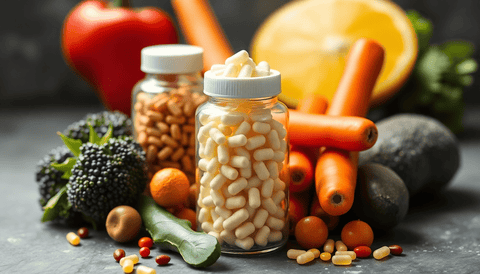Vegan Vitamins: What Nutrients Are You Missing?
Choosing a vegan diet can bring many health benefits, including lower cholesterol levels and reduced risk of heart disease. However, cutting out animal products also means you might miss out on some key nutrients. Understanding which vitamins and minerals are harder to find in a plant-based diet can help you make better choices. This is where vegan vitamins and plant-based supplements come in to play an important role.
Why Vegan Nutrition Requires Special Attention
Eating only plants sounds healthy, but some nutrients are tricky to get without animal foods. This can create gaps in your diet that might affect your energy, immunity, and overall health. Nutrients like vitamin B12, vitamin D, iron, and omega-3 fatty acids tend to be less available from plant sources alone. Supplements help fill these gaps, ensuring your diet stays balanced and your body gets what it needs.
Key Nutrients Often Lacking in Vegan Diets
Vitamin B12 for Vegans
Vitamin B12 is essential for nerve function and DNA production. Without enough B12, you could feel tired, weak, or develop nerve problems. The challenge for vegans is that vitamin B12 is found almost exclusively in animal products, like meat, dairy, and eggs. Plants don’t naturally provide B12, so vegan supplements are vital. Taking a reliable B12 for vegans supplement supports healthy brain function and keeps energy levels up.
Vegan Vitamin D
Vitamin D supports strong bones and a healthy immune system. It’s called the “sunshine vitamin” because your skin makes it when exposed to sunlight. But during winter months or in less sunny climates, getting enough vitamin D can be tough. Vegan vitamin D supplements, usually derived from lichen or mushrooms, offer a plant-based alternative to traditional sources. Using these supplements can help maintain bone health and overall wellness.
Other Nutrients to Watch
Iron from plants is less easily absorbed than iron from animal sources, which means you might need to eat more or look for iron-fortified foods. Omega-3 fatty acids, important for heart and brain health, are found in flaxseeds, chia seeds, and walnuts, but sometimes supplements offer better support. Calcium and zinc are other minerals vegans should monitor to ensure they meet their daily needs through fortified foods or supplements.
Plant-Based Supplements: What to Look For
When choosing vegan vitamins and supplements, quality matters. Look for certified organic products to avoid pesticides and chemicals. Allergen-free supplements can help those with food sensitivities. Trusted international brands ensure rigorous quality control and safety standards. Plus, if you’re in the EU, fast shipping makes it easy to get what you need without long wait times.
How to Choose the Right Vegan Vitamins for You
Start by reviewing your diet and lifestyle to spot any nutrient gaps. If you’re unsure, consulting a healthcare professional can provide personalized advice. When picking supplements, read the labels carefully. Look for blends that match your nutritional needs and include clear ingredient lists. Plant-based supplements should fit smoothly into your routine and support your health goals.
Benefits of Using Vegan Vitamins from Topvitamine
Topvitamine offers 100% natural supplements designed with vegans in mind. Their products come from certified quality sources, ensuring safety and effectiveness. Customers appreciate the organic, allergen-free options that align with their plant-based lifestyles. With trusted international brands and fast EU shipping, Topvitamine makes staying healthy on a vegan diet simple and reliable.
Conclusion
A vegan diet can be healthy and fulfilling, but keeping track of your nutrient intake is key. Vitamins like B12 and D, as well as minerals like iron and calcium, often need extra attention. Considering plant-based supplements is a smart way to fill any nutritional gaps. For high-quality, natural vegan vitamins, explore Topvitamine’s range and support your health the natural way.



